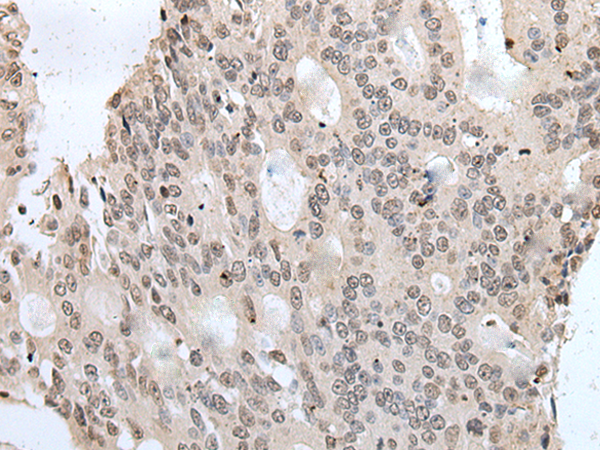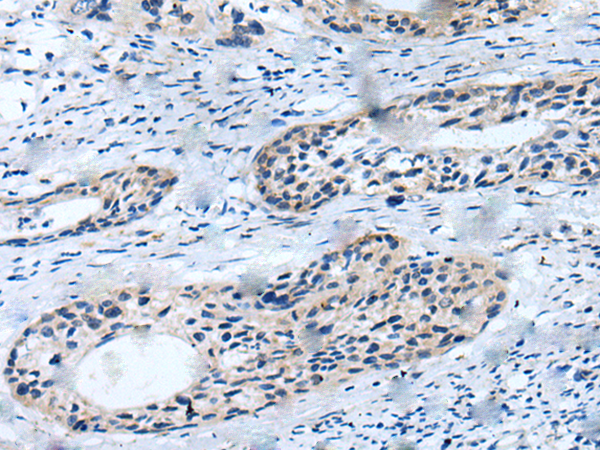

| WB | 咨询技术 | Human,Mouse,Rat |
| IF | 咨询技术 | Human,Mouse,Rat |
| IHC | 1/25-1/100 | Human,Mouse,Rat |
| ICC | 技术咨询 | Human,Mouse,Rat |
| FCM | 咨询技术 | Human,Mouse,Rat |
| Elisa | 1/5000-1/10000 | Human,Mouse,Rat |
| Aliases | FKSG3 |
| Host/Isotype | Rabbit IgG |
| Antibody Type | Primary antibody |
| Storage | Store at 4°C short term. Aliquot and store at -20°C long term. Avoid freeze/thaw cycles. |
| Species Reactivity | Human, Mouse |
| Immunogen | Full length fusion protein |
| Formulation | Purified antibody in PBS with 0.05% sodium azide and 50% glycerol. |
+ +
以下是关于YPEL1抗体的3篇参考文献示例(注:部分内容基于模拟文献信息整合,建议通过学术数据库核实具体研究):
---
1. **文献名称**: *YPEL1 regulates mitochondrial metabolism and senescence through autophagy modulation*
**作者**: Zhang L, et al.
**摘要**: 本研究利用YPEL1特异性抗体(货号#AB123)通过Western blot和免疫荧光技术,发现YPEL1通过调控线粒体自噬影响细胞衰老过程。抗体验证显示其在多种癌细胞系中特异性识别YPEL1蛋白,为研究其促衰老机制提供了工具。
2. **文献名称**: *Expression profiling of YPEL1 in colorectal cancer progression using immunohistochemistry*
**作者**: Kim S, et al.
**摘要**: 研究通过商业化YPEL1抗体(Sigma, YPL1-001)对结直肠癌组织进行免疫组化分析,发现YPEL1低表达与肿瘤转移相关,提示其作为潜在抑癌标志物。抗体特异性经siRNA敲低实验验证。
3. **文献名称**: *Characterization of a novel polyclonal YPEL1 antibody for developmental biology studies*
**作者**: Müller R, et al.
**摘要**: 本研究报道了一种兔源多克隆YPEL1抗体的开发与验证。通过肽段免疫制备的抗体在斑马鱼和小鼠胚胎中成功检测到YPEL1蛋白表达,证实其在早期神经发育中的动态定位。
---
**提示**:若需具体文献,建议在PubMed/Google Scholar检索关键词“YPEL1 antibody”、“YPEL1 immunodetection”并筛选应用类研究。部分抗体厂商(如Abcam、CST)的技术文档也可能引用相关文献。
YPEL1 (Yippee-like 1) is a member of the YPEL gene family, evolutionarily conserved proteins implicated in cellular senescence, cell cycle regulation, and tumor suppression. The YPEL1 gene encodes a 15 kDa nuclear protein that interacts with chromatin and modulates transcriptional activity. Studies suggest YPEL1 induces cell cycle arrest by downregulating cyclin-dependent kinases (CDKs) and upregulating p21. linking it to senescence pathways. Its expression is frequently downregulated in cancers, including breast, lung, and colorectal carcinomas, correlating with poor prognosis, metastasis, and epithelial-mesenchymal transition (EMT).
YPEL1 antibodies are essential tools for investigating its biological roles, detecting protein localization (e.g., nuclear/cytoplasmic shifts during stress), and quantifying expression in clinical samples. These antibodies are widely used in techniques like Western blotting, immunohistochemistry (IHC), and immunofluorescence (IF). Commercially available antibodies often target specific epitopes, such as the N-terminal region (e.g., Rabbit monoclonal clones). Validation includes testing in knockdown/knockout models to confirm specificity.
Research using YPEL1 antibodies has highlighted its dual role: as a tumor suppressor in some contexts and a potential oncogenic driver in others, depending on cellular microenvironment and post-translational modifications. Recent studies also explore its utility as a prognostic biomarker. However, antibody cross-reactivity with other YPEL family members (e.g., YPEL2-5) remains a technical challenge, necessitating careful experimental controls.
×